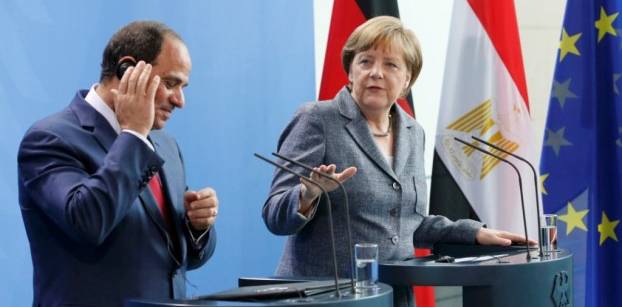Merkel: We need migrant deals with African states like EU-Turkey pact

Joint press conference for Egyptian President Abdel Fattah al-Sisi and German Chancellor Angela Merkel on June 3, 2015. Reuters photo
BERLIN (Reuters) - German Chancellor Angela Merkel on Monday said the European Union needed to establish migrant deals with African countries such as Egypt and Tunisia along the lines of the agreement it already has with Turkey.
She also said more must be spent on development aid to deal with the root causes of migration, adding that it was critical "to prevent a repeat of the situation seen last summer". The arrival then of hundreds of thousands of people fleeing war and poverty in the Middle East and beyond marked Europe's biggest migrant crisis since World War Two.
"It's important that we give the African countries perspectives for the future," Merkel said during a conference on tourism. "We either have to let people come to us, or we have to combat the root causes of migration so that people see prospects for staying there, close to their homes."
Merkel gave no specific details about possible migrant deals between the EU and African countries, which unlike Turkey are not candidates for membership of the bloc, but she has repeatedly raised the issue, including at the recent G20 summit in China.
The EU and Turkey agreed in March that Ankara would stem the flow of illegal migrants to Europe in exchange for financial aid and the promise of visa-free travel.
In June, Merkel described Africa with its population of 1.2 billion people as "the central problem" in the migration issue.
Also on Monday, German Interior Minister Thomas de Maiziere met his Tunisian counterpart Hedi Mejdoub in Berlin to discuss security issues, organised crime and illegal migration.
The two ministers agreed to form a German-Tunisian working group to expand cooperation on security matters, and to work on a direct exchange of data, expertise and know-how, the German ministry said in a statement. They also signed an agreement about bilateral cooperation on security issues.
"Both ministers agreed to intensify the cooperation between the two countries, especially with regards to accelerating the repatriation of Tunisian citizens who had illegally entered Germany," the ministry statement said.
Mejdoub also met with the head of the interior committee in the German parliament, a key state official from the German state of Sachsen, and other groups.
(Reporting by Andreas Rinke; Writing by Michelle Martin and Andrea Shalal; Editing by Catherine Evans)









facebook comments